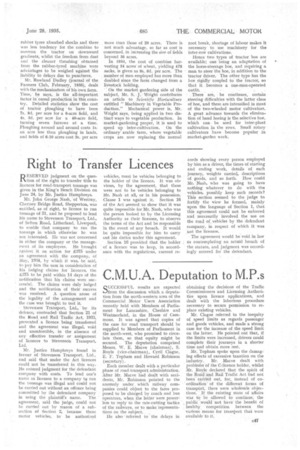C.M.U.A. Deputation to M.P.s
Page 97

If you've noticed an error in this article please click here to report it so we can fix it.
QUCCESSFUL results are expected Ofrom the discussion which a deputation from the north-western area of the Commercial Motor Users Association recently held with Members of Parliament for Lancashire. Cheshire and Westmorland, in the House of Commons. It was agreed that copies of the case for road transport should be supplied to Members of Parliament in the north-west, who promised to circulate them, so that equity might be secured. . The deputation comprised Messrs. W. E. Macve (chairman), S. Royle (vice-chairman), Cyril Clague, E. F. Topham and Howard Robinson (secretary).
Each member. dealt with a particular phase of road-transport administration. After Mr. Macve had dealt with accidents, Mr. Robinson pointed to the anomaly under which railway companies could object to the fares proposed to be charged by coach and bus operators, when the latter were powerless to reply to the rate-cutting tactics of the railways, or to make 'representations on the subject.
He also ' referred to the delays in obtaining the decisions of the Traffic Commissioners and Licensing Authorities upon licence applications, and dealt with the laborious procedure necessary to secure permission to replace existing vehicles.
Mr. Clague referred to the inequity of speed limits as regards passenger and goods vehicles, and made a strong case for the increase of the speed limit on the latter. He pointed out that, if the limits were increased, drivers could complete their journeys in a shorter time and obtain more rest.
Mr. Topha,m spoke upon the damaging effects of excessive taxation on the industry. Mr. Macve dealt with probleffis of the C-licence holder, whilst Mr. Royle declared that the spirit of the Road and Rail Traffic Act had not been carried out, for, instead of coordination' of the different forms of transport, there were wholesale objections. H the existing state of affairs was to be allowed to continue; the public would.not have the benefit of healthy competition between the various means for transport that were available to it.




























































































































































